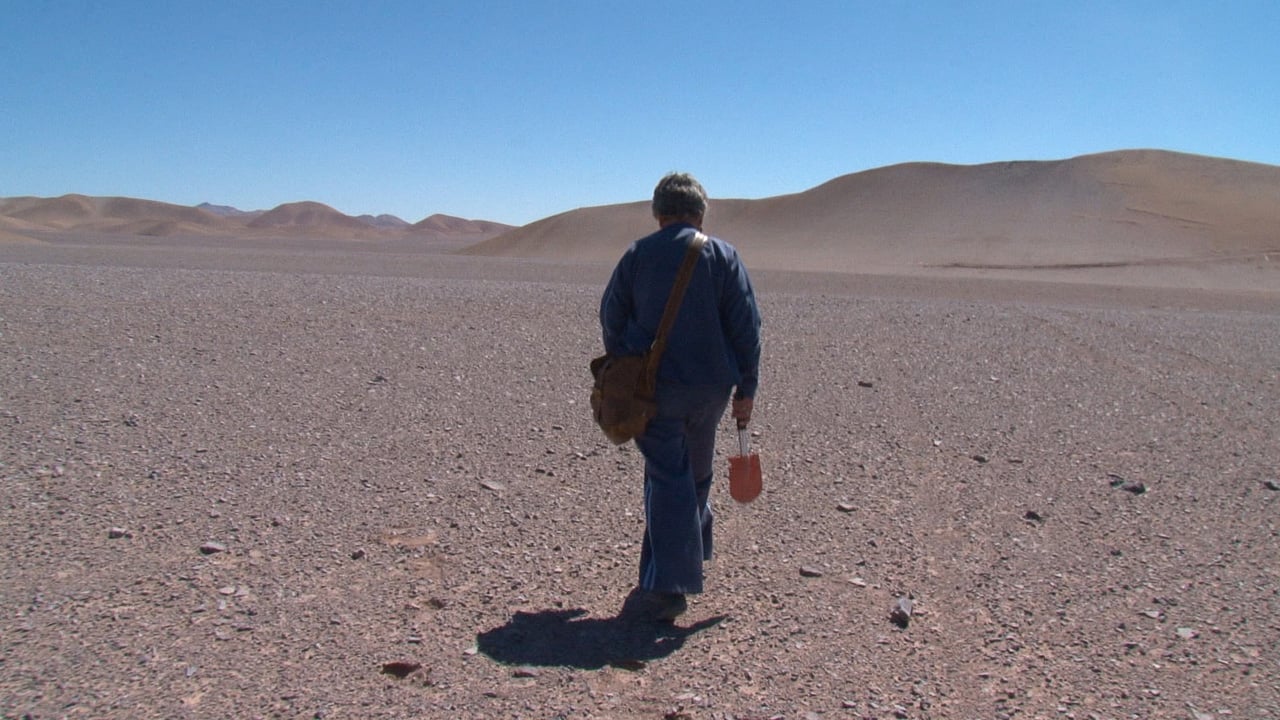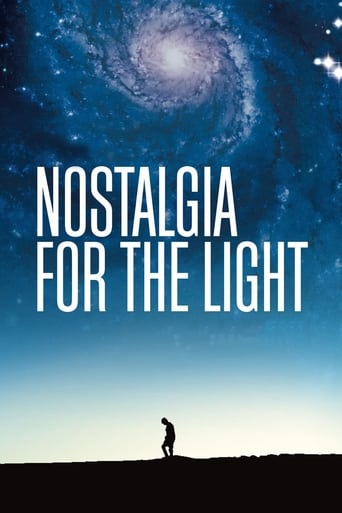



good back-story, and good acting
It really made me laugh, but for some moments I was tearing up because I could relate so much.
View MoreThis is a dark and sometimes deeply uncomfortable drama
View MoreA movie that not only functions as a solid scarefest but a razor-sharp satire.
View MoreWho but Patricio Guzman would match the political woes, abuses and lasting traumas of Augusto Pinochet's regime with the philosophical questioning of a group of astronomers studying the vast universe from Atacama Desert in Chile. The tenuous connection, as the documentary states, is their shared study of bodies; one ravaging the desert sands for the remains of their loved ones and the other scanning the skies for the larger, celestial wonders. And yet in some ways, Guzman has made the two narratives similar in their evocations of time passing and what those spaces are filled with. We know, for example, that some of the galaxies and stars that the astronomer's massive telescopes are pointed at are so far away that even light's travelling speed does not escape the passing of time; like the Pillars of Creation, these bodies may have already been eroded at the moment of study. So in a sense, both these groups are studying the past, but they move in different directions with each discovery. Guzman's voice-over narration is the filter in which we judge these events. It's words are not light; in fact they are full of philosophical posturing and grandiose, sometimes pretentious ideas and metaphors about the very nature of discovery and the vastness of the universe. The problem is that it also affords the victims of Pinochet the same tone - the flowery, poetic language describing the heavenly bodies in the skies and in the furthest reaches of the galaxies and beyond is also applied to the bodies and minerals buried in the sands of the desert. The cinematography here, when not concerned with authenticity and vigorously shaking the camera whilst it follows these human beings in their daily activities, tries to match the majesty of the time-lapses of the stars and the supernovas flying by, but of course that is impossible, so to substitute Guzman awkwardly inserts archival footage to attempt a power balance. But not before he gives an exhumed corpse the same insufferable treatment: a slow, meandering gaze, the camera moving as patiently as possible, as if to milk every last drop of profundity even as we do not hold the same emotional perspective as the real victims and their loved ones. Much of the documentary is filled with these moments. The opening is the agonisingly long sequence of events of machinery and gears grinding and whirring around to begin another day of stargazing. And in the end too, it seems to facilitate the same objective, but also the joining of the two groups in a mutual admiration of the stars. It adds what I assume is a digital effect, portraying the very essence of being caressed by star dust, little golden particles floating around in the air. This does not look particularly convincing - it instead renders a magical, fairytale like effect. For all the faux awe-inspiring images this film gives us, none are as effective as the simple recount from Valentina, who is amongst those still mourning the unseen losses from Pinochet's dictatorship. She connects the two strands much better than any whispered, ostentatious figurative language could. It is not a link that hurtles across universal spaces to force a similarity but rather a personal, determined one, borne out of her own grief and emotional bargaining. There is not a hint of posturing here. The same might not be said of her grandparents, whose director's staging instructions were probably 'stare silently and forlornly at the camera'.
View MoreI had heard this was a documentary about the Chilean Disappeared of the Pinochet regime and as such it took me a while to decide to watch it since one does tend to lean towards easier viewing after a day at work. I had recently been on a run of documentaries about heavier subjects and decided that this would be next, expecting it to be very much about pain, death and loss. I was a bit thrown when the film opens and appears to be about astronomy but I went with it as I figured it was best not to let what I assumed guide the film but rather let it lead me!What I found was that this isn't really a documentary in the traditional sense; yes it is real life and fact based, but we don't have a specific subject revealed or examined in the way you would expect from a historical documentary. Instead what we get is more of a musing or mediation that plays like a combination of documentary, poetry, art and science (non) fiction. This sounds pretentious but it really isn't and the way it is presented means that discussions about how there is no actual "present" and that our atoms come from the stars sit comfortably next to discussions with a woman whose parents were disappeared when she was 1 year old and a 70 year old who goes daily into the desert endlessly searching for bones of those dumped there decades prior. All of it works and is equally engaging and, more importantly, compliments each other in a way I didn't expect.Content-wise the film has a real peaceful beauty to it while also looking at terrible situations with a lot of pain and loss. It is fitting that the film is also visually beautiful. The use of shots of galaxies spinning through the clear sky over the desert is a real help to this, but even smaller moments of a woman picking through dirt are really well shot and do not contrast with the shots of space. The visuals add to the content really well and I was surprised by how engaged I was; it wasn't that it informed me about a lot (although it did a bit) but more that it invited me to think with it, to muse with it and I really enjoyed that sensation.As an idea it really shouldn't work at all and experience tells me it should have come out as a pretentious piece of soul searching like an art student did it, but it is nothing of the sort. It is beautiful, engaging, thought-provoking and really well filmed and constructed. Go with it – it is very good.
View MoreThis film is not a documentary in the traditional sense. It is more a work of poetry, or a spiritual experience.The brutal results of Pinochet's military dictatorship are meshed with the search for the origins of the universe. Both subjects deal with the past, as we only have past and future; there is no present as Augustine said many years ago.So, astronomers are really archaeologists. They study space to discover the past. Writer/director Patricio Guzmán combines this "archaeology" with the archaeologists who search the desert for the bodies buried by Pinochet.A fascinating story.
View MoreThis beautiful film will capture you emotionally, visually and intellectually. Patricio Guzmán's examination of light—its relationship to the past and what it illuminates of the future—is stunningly beautiful, insightful and very well shot. A scientist states early on in the film that there is no present only the past and future as the words he is forming with his mouth have already happened by the microsecond it takes for his voice to travel from his mouth to his subject's ears. It is this sort of abstract thought that permeates the films dialogue creating the mood.
View More